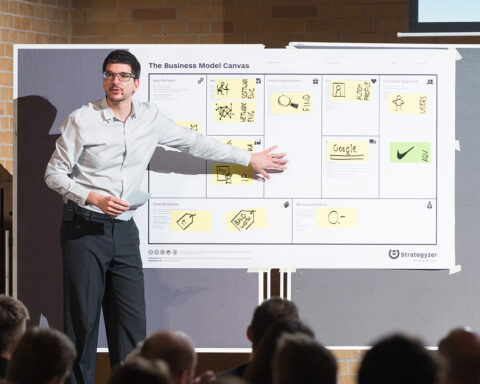- Introduction: Companies need to rethink themselves
When are large companies formed? Ultimately, whenever there are clear requirements in society, for which clever people develop appropriate solutions. With these solutions in massive demand, the organisational units that provide them – companies, in other words – grow.
Companies provide answers to the questions of society. That is undoubtedly an important role. But perhaps it is also precisely the reason why companies themselves are not particularly good at asking questions. Simon Sinek sums this up in his book, in which he appeals to companies to “start with why”. What he means by this is: they should stop taking the status quo as a given, and instead ask themselves, over and over, why they actually do what they do. Why do we exist as an organisation? What is our “mission”? Why are we needed? According to Sinek, these questions must be answered first, before addressing secondary questions, such as: which processes do we need? What kind of product do we want to deliver?
Quoting Sinek at the start of my article doesn’t mean that I advocate a philosophy that does not, or no longer, values products. On the contrary, great products are important and will be even more so in the future. It takes a great deal of inspiration and enthusiasm to create products that in turn inspire customers. However, in order to create those kinds of products we must know the answer to the question “why”. Only then are we and our customers sure that this is a great product. We can be sure it’s right for the times, we can be sure it’s of value to society and fulfils a mission.
This article will focus on these missions and how they are formed, showing that we must throw some of our established operational routines overboard. Businesses must reinvent themselves – because simply managing routines is no longer enough. Companies must open up and be prepared to acknowledge the innovative power sprouting in different areas of society and to connect with it. They must understand that, in the words of sociologist Manuel Castells, we are living in a network society. For companies, this also means thinking in networks. And whether they want to or not, it means increasingly transforming into network-like structures themselves.
I would like to explore the consequences of this shift for a company like the BMW Group. I will demonstrate that we are no longer at the very beginning of the process of becoming a network. Specifically, I’ll discuss the many networks we as a company are currently forming with small, innovative start-ups all over the world. I will look at why they can be beneficial for both sides, and I will argue that they show the way for the reinvention of the company I call for in this article.
- The BMW Group start-up offensive: the company as network
As a company, we regard networking with small, smart innovators as part of our corporate strategy. This is not actually a new approach, but our active involvement in innovation networks has intensified significantly in recent years. And we also consider that large cooperations can also set up small operations, projects or indeed business units that act as startups. Today, our network is based on three pillars.
First, our three Tech Offices worldwide: Since 1998, the BMW Group Technology Office USA has been an established location in Silicon Valley – where many of the trends of tomorrow originate. The main function of this location is to identify the latest relevant technologies and trends for the BMW Group at an early stage and translate them to products as quickly as possible. Researchers here benefit from the unique Silicon Valley environment. Where else can you find market leaders from all different industries, outstanding universities, innovative start-ups, venture capitalists and business analysts all in such close proximity? The team is currently conducting research in the following five areas: trend-scouting and technology partnerships, sustainable mobility, in-car connectivity, driver assistance systems and user experience.
We operate additional Tech Offices in Shanghai and Tokyo. At these “idea centres”, we have been working with start-ups for some time and have established an effective process. Through this, we have already gained hands-on experience of how to transform vague ideas into real innovations – and an understanding of what can disrupt or even derail the process that leads to market maturity.
The second focal point of our network strategy is our main location in Munich, where we work very closely with the local Technical University. The heart of the collaboration is “UnternehmerTUM”, the University’s Centre for Innovation and Business Creation, which promotes the formation of innovative businesses from within the University’s intellectual environment. We are now helping UnternehmerTUM expand an entrepreneurship centre at a research campus in Garching, just outside of Munich.
The Californian start-up TechShop also plays an important role. TechShop provides rooms and facilities for innovators to realise their ideas. We are now bringing this approach to Germany with UnternehmerTUM, because we believe that TechShop’s Silicon Valley innovation culture can give a major boost to entrepreneurship in Germany. In addition to existing training and consulting services, the new spacious centre will also provide a high-tech workshop infrastructure of machines, tools and software for prototype construction and small-series production. TechShop will establish its first German workshop in Garching.
This high-tech workshop will be open to the public and is designed, in particular, for use by creative people, start-ups and BMW Group employees, as well as other companies. The Entrepreneurship Centre is geared towards innovators and those starting their business at both national and international level. We believe it will provide new impetus for innovation in Bavaria and strengthen Munich’s standing as a high-tech location. The initiative also aims to boost local networking between the city, universities, start-ups, businesses and the local creative scene. A network philosophy always entails a process of permanent growth – because a network is only as good as the growth processes it implements. Our initiative is committed to this objective.
This basic idea also shapes the third pillar of our network strategy: our New York-based idea incubator “BMW i Ventures”, a venture capital company through which we invest in promising businesses in the field of mobility. In this area in particular, there are currently many exciting ideas about how to offer people faster, more convenient mobility. These are the approaches we look for with BMW i Ventures. The alliances that arise from this combine the resources of the BMW Group with the pace and flexibility of successful start-ups.
However, we are not merely looking for quick wins. Our goal is to form long-term strategic partnerships. We have already screened more than 700 businesses and initial direct investments have been made. The focus here is on actively shaping all aspects of individual mobility for the future.
As mobility gradually centres more on urban scenarios, it also means that companies like the BMW Group will increasingly become active urban players. BMW i Ventures is an important factor in this development, and this approach could be called a strategy of urban innovation.
Through BMW i Ventures, we now have direct involvement in seven start-ups, including “Park-at-my-House”, which started out with the realisation that many parking spaces are not used on weekends – either by private individuals or, especially, companies – while drivers spend considerable time looking for somewhere to park. “Park-at-my-House” brings supply and demand together in a virtual marketplace. It works, and is also performing well as a business.
A second example is “Chargemaster”, the largest provider of charging stations in the UK. Having invested in this company, we have launched a joint project under the name “ChargeNow”. ChargeNow is a mobility service offered by BMW i, which makes it fast and easy to locate and operate public charging stations, the “ChargeNow card” enables cashless payment.
This service naturally also supports the market launch of our first purpose-built electric vehicles, the BMW i3 and our plug-in hybrid sports car, the BMW i8. It is a further example of the importance of viewing products in a more integrated manner within their social context.
These business ventures also show that we never consider individual innovation projects in isolation. Projects like this allow us to network totally different investments and ideas from within our company and from start-ups. I firmly believe that the future lies in this kind of integrated thinking – and not just for the automotive industry.
This is why we have decided to take our commitment to innovation one step further: beyond individual mobility. Our new “BMW Impact Ventures” unit is tasked with taking up the mission of BMW i and broadening it – to make sustainable urban living more enjoyable. Focusing on people, their habits and preferences, we search for innovative solutions that improve their daily lives in major cities. Connecting to start-ups around the world and setting up a supportive environment in locations in the U.S. and Germany, the team’s aim is to help these solutions to be realised, to grow and to be successful in the long term. We strive to provide individuals with better urban experiences, so we invest in promising smart hardware, believing, as we do, that after the boom in software and social media, hardware is poised for a revolution. The engines that make a city run – energy, food, buildings, water, transport, waste management – are physical. A revolution in hardware creates an opportunity to alter our built environment and change our fundamental experience of cities. And as something of a hardware expert, we believe the BMW Group is well positioned to play a role in this trend – and eventually extend our reach and relevance to both start-ups and customers.
- Networks and the ideal company: three essential features
What do these points tell us about a successful company today? To what extent can they be applied to other industries? And to what extent can engagements such as these contribute to a new understanding of what a company is? I would like to discuss what defines the ideal company of the future for me, with reference to three key concepts: “high speed”, “high profit” and “high relevance”. This is where I believe competitive success will be decided in the next 20 years and beyond.
3.1 High speed
It may be something of a cliché, but there is one particularly crucial development in the automotive sector currently: The economic world we live in is moving faster all the time, creating a new culture of speed that we as companies must accept. This requires us to abandon our long-established habits. We see this with innovation cycles in particular, as they become shorter and more numerous, forcing companies like the BMW Group to innovate on a permanent basis. This demands a culture of speed, especially in the field of innovation. In other words: We need a culture of innovation – under rapidly changing market conditions.
Here, in particular, we can learn from the start-ups we work with. Start-ups are ultimately force fields, whose very existence depends on their speed of innovation. They came into being because they were able to transform vague basic ideas into market products quickly. With a partner like the BMW Group at their side, they also have access to the necessary process expertise and – there is no reason to deny it – the funding they need. In return, we at our company can emulate their culture of innovation – as long as we allow this to happen. As a result this requires a company like the BMW Group to be willing to constantly evolve and challenge the status quo.
Risk is another important concept in this context. Almost 30 years ago, sociologist Ulrich Beck noted that we live in a risk society. However, his meaning has often been narrowed down to the idea that risk is an aspect of capitalist culture we should be critical of. But Beck never intended the term to be reduced to this. He regards risk as a basic element of modern society – which consequently makes the idea of risk-taking sound very modern: That was true 30 years ago, and even more so today.
When we talk about operating in conditions requiring speed, a risk-taking culture becomes an important success factor. Swift and consistent action requires tolerance of certain risks. This has nothing to do with a gambling mentality. It is about consciously taking controlled risks, charting new territory and viewing what initially appears unfamiliar not as something dangerous, but as an opportunity to create something new – new ideas, services or products.
Once more, we can learn from the world of venture capital, which already contains the idea of risk in the word “venture”. Here, capital is invested in exciting, but ultimately uncertain, ventures – ventures that are themselves highly risk-tolerant. In many cases, it is precisely this basic attitude that generates new ideas for products or previously unthought-of solutions to problems. This would appear to me to be a very appropriate and modern attitude – particularly in the context of mobility, itself an inherently volatile field. (Mobility is, after all, the complete opposite of standing still.)
3.2 High profit
There is one area where all of these considerations, possibly contrary to popular belief, do not require any kind of change, and that is in companies’ need to remain profitable in order to grow. The new type of business described in this article is no less geared towards generating profit. In fact, profits are necessary. Profits finance new products, create new jobs and contribute to positive change in society.
But how do companies remain profitable? I believe that one of the key answers is to dare and see the world through the eyes of our customers in all areas of the company. Of course, that is easier said than done. And of course, there are many other factors that affect a company’s profitability. Why the customer? We know that classic segmentation models no longer apply to the extent they used to. Who is this mythical creature that goes by the name of “customer”? To generate profit means also to know what the customers want before they do. That means to anticipate their expectations and figure out how a company can constantly exceed them. Moreover, we must always be accessible towards having an open dialogue with customers, and we must create new platforms for exchange with them. Through such endeavours we can offer products and services that are meaningful and valuable to our customers’ personal experience and lives. And we must give our customers the opportunity to interact with us wherever they choose to do so –not just where we feel it suits our internal processes.
At the same time, we must respond to the real-life issues our customers face. We must discover or, even better, anticipate, where challenges lie. This is another area in which trail-blazing start-ups are ahead of large corporations, since they themselves are usually founded in response to a very specific everyday issue – often one the entrepreneurs have encountered themselves. That is what makes their products so marketable. Companies like the BMW Group also need the kind of marketability that comes from consistent customer focus. We believe we are on the right track, but complacency and standing still are fatal, and are rightly punished by customers and can result in destroying the value of a company instead of creating more of it.
3.3 High relevance
That final point brings me to the third element of a new understanding of companies: the aspect of “high relevance”. Businesses and brands can only thrive today if they do more than just make functional products and indifferently satisfy clearly defined material needs. They need to create added value for society by being relevant. I call that “human emotional branding” instead of “product branding”. That is the only way to answer Sinek’s opening question of “why?”
This involves an expanded concept of the company that goes far beyond what is generally understood as Corporate Social Responsibility. Rethinking the company above all means identifying social challenges and supplying the appropriate solutions – independent of purely commercial goals. Corporations must therefore make their expertise, infrastructure and resources available to serve a meaningful purpose and make a valuable contribution to the public good.
In her speech on “Continuity in change – corporate values in the 21st century”, Susanne Klatten talked about people and the common good as the focus of a higher form of economy. She advocates “a common position” of economy and society to “direct their efforts to serve a meaningful purpose and achieve the satisfaction of worthwhile pursuits.” The only way to make the economy important and relevant to each and every person is through the enhanced understanding of companies discussed here – in the sense of the cooperative culture described in part 2 as a network culture. Only then will society be pleased to have companies at its heart.
- Start-up campaign and open innovation
When all these considerations are correct, it becomes clear that people play a crucial role in the innovation process. Traditionally, marketing theory believes consumers are easy to influence. But this thinking – along with traditional marketing – is changing. It is no longer enough for companies to innovate quietly behind closed doors and then suddenly emerge onto an unprepared market with new products. Instead, they must open up their innovation process – to partner companies, as described above in the BMW start-up campaign. Or to the people who buy their products and will ultimately shape their lives with them.
The academic community refers to this as “open innovation” (Reichwald and Piller 2009), a form of interactive value creation. It is no longer the brilliant single developer who lays the foundations for innovation at a company. Rather innovation – and therefore value creation – occurs in a collaborative process between company, institutional partners (such as start-ups) and customers.
That is why it is so important to create the right culture within the company. The work it takes to achieve this should not be underestimated. For companies used to a closed-door policy on innovation, “open innovation” represents a major cultural revolution.
However, if a company succeeds in integrating its customers into the value creation process, it can tap directly into a social trend that is gaining more and more ground, referred to in the U.S. as a “makers’ culture”. This is based on the simple truth that people want to do more and more things for themselves (Dougherty 2012). It is not necessarily opposed to the role of companies, but rather to them telling customers what to do. People want to shape their lifestyle for themselves – and they want to be involved in creating, refining and individualising products. Smart companies give them the opportunity to do so.
- Concluding remarks
I have argued that companies must totally rethink who they are. They must think of themselves as a network and pursue networking strategies to share their expertise in collaboration with start-ups. They should include the aspect of relevance in their target system, which may have been geared towards profit and speed in the past. They should acknowledge their responsibility as a “good corporate citizen” within civil society and make their expertise available. And they should open up their innovation process to external input.
All of these aspects are an extension of our classic understanding of companies. In the automotive industry, rethinking also means that the quantitative parameter used almost exclusively in the past – namely, volumes in the sense of sales volumes – is no longer sustainable as the sole criterion for success. Up until now, a smooth process that sells as many cars as possible has been the predominant measure of success. But a business that defines itself as a partner in the process of individual mobility, as outlined here, thinks beyond that. It regards the selling of vehicles as one factor in an encompassing strategy that contains societal as well as economic elements. Its target system focuses on the individual and his or her need for mobility. Clearly, the vehicle is no longer the sole solution here. However, as a key element in a comprehensive strategy for a mobile future, it will continue to play a pivotal role in promoting economic development and growth in society going forward.










